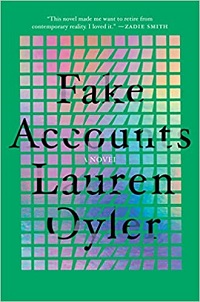
From the Publisher: On the eve of Donald Trump’s inauguration, a young woman snoops through her boyfriend’s phone and makes a startling discovery: he’s an anonymous internet conspiracy theorist, and a popular one at that. Suddenly left with no reason to stay in New York, our unnamed narrator flees to Berlin, embarking on her own cycles of manipulation in the deceptive spaces of her daily life, from dating apps to expat meetups, open-plan offices to bureaucratic waiting rooms.
With the announcement of her debut novel, Lauren Oyler expected divisive reactions; she’s a literary and cultural critic, one who has had her share of controversial takes over the years. Oyler has said she has a problem with the “moral obviousness of contemporary fiction,” even going so far as to critique the critiquing — modern critics “emphasize the primacy of emotions and the importance of ‘empathy’ in order to avoid the discomfort of thought and the stakes involved in taking a position.” It’s not surprising, then, that Oyler’s novel attacks the very issues she has with the industry.
Fake Accounts tells the story of an unnamed narrator who discovers her boyfriend Felix, an artist who is vehemently against all social media, actually runs a massively popular conservative conspiracy theory Instagram account. Before she can work up the courage to break up with him (or even confront him), a twist happens that inspires her to leave her work as a writer and move to Berlin, the city where she and Felix originally met.
The narrator is a clear rendering of Oyler’s (somewhat exaggerated, hopefully) real life. She’s sassy, snarky, and probably meets a lot of the criteria for narcissism. She spends most of her day on social media while writing about how awful it is; she does yoga even though she hates it; she finds most activism too performative and ingenuine (Oyler gained Internet popularity for her critique of modern feminism), and in a more meta-take, rails against modern fiction that sells well because it’s shallow and brief: “Having read several because they were easy to finish, I couldn’t help but object: this trendy style was melodramatic, insinuating utmost meaning where there was only hollow prose, and in its attempts to reflect the world as a sequence of distinct and clearly formed ideas, it ran counter to how reality actually worked.” Oyler then changes her writing style for a portion of the book, morphing into the very thing to which the narrator claims to object.
Oyler was correct in her prediction — Fake Accounts has garnered attention both negative and positive. In a world where it seems too many book reviews boil down to “unlikable character = unlikable book,” it’s easy to get why Oyler (and the narrator) find literary society so exhausting. Oyler’s writing is sharp, and her depictions of the insipid nature of our online personas are refreshing. It’s easy to read a description and think Fake Accounts is just a critique of social media, but that’s a somewhat lazy take, one that ultimately says more about contemporary fiction — and its “moral obviousness” — than it does Oyler’s book.
Fake Accounts is available for checkout at the Galesburg Public Library.

